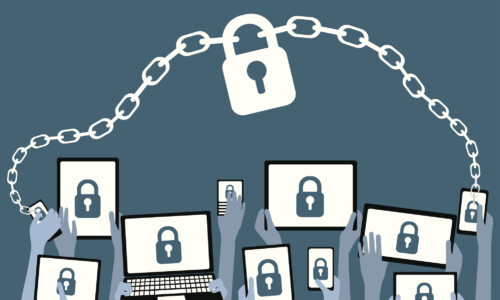
Make It Your New Year’s Resolution to Keep Your Data Safe
15 January 2021
Each of us has a wealth of online accounts, whether it’s for internet banking, purchasing goods or sharing updates with friends and family. And due to the current pandemic, you may be shopping and communicating online more than ever before.
According to research conducted last year by password manager, NordPass, the average person has between 70 – 80 passwords each. If you consider that many of these passwords are reused or modified slightly for different websites, that means that a lot of your personal data could be at risk through a lot of different online accounts.
So how do you make sure your passwords and accounts are not susceptible to hackers?
Here, we’ve put together our top tips to ensure your data is as protected as possible.
DATA PROTECTION TOP TIPS:
– Make sure each password is unique to each separate account. Although it is tempting to use the same password for multiple different logins, it means that hackers only need to guess once to access all of your data. This applies to changing passwords slightly too – for example, dancing1 and dancing2 are too similar to use for your different accounts so don’t be tempted to use this method.
– Each website has its own specific rules when it comes to password length, but a good rule of thumb is to choose a password that is at least 12 characters long, preferably around 20 characters. It can be tempting to choose the shortest possible option for that particular account, but by inputting the minimum length, you leave yourself open to hackers.
– It’s often specified when you’re at the account creation stage, but make sure to choose a combination of upper and lowercase letters, numbers and symbols when creating a password. If you can substitute these for letters, it will probably be easier for you to remember – saving you valuable time. If you choose your favourite author, for example, Ernest Hemingway, this could be a good way to remember it: Ern38tH3m1ngw#y.
– If you’re looking for inspiration when coming up with all of these different passwords, consider films, books, characters or song titles – as long as you don’t choose personal names, birthdays of family or friends, pet names or anything else that could be easily associated with you. It made headline news recently when Donald Trump’s Twitter account was hacked because his password was guessed correctly. The secure password he used? maga2020!
– Another step of security when setting up many online accounts, particularly for social media or banking, is to create a security question. It’s important that you don’t make these guessable either – if you know someone could view your Facebook profile and find the name of your first pet, or your first school, think of something more complex. Or better yet, use a made up answer that only you know!
– Perhaps the most obvious point – don’t share your password with anyone else. Not only does it put your account at higher risk of being compromised, but it means that the person using your account will be interacting as you. If they don’t value your privacy as much as you do, this can leave you vulnerable to not only data risks, but also identity theft.
– Particularly useful in a business setting but also really helpful when it comes to managing all of your online accounts, online password vaults can keep everything encrypted and in one place. In the office environment, this means only giving access to login details to certain members of the team so that passwords aren’t being shared over emails or messenger apps (which could be accidentally forwarded or misplaced). This can be particularly valuable now the majority of offices are working from home.
– Once you’re all set with your secure passwords, it’s a good idea to have a digital clear out of old accounts you no longer use. Whether that’s a social network in which you’ve liked your favourite sports team, or a retail environment where you’ve stored card details and your address, if you no longer use or need the account – delete it. It’ll be easier for you to keep track of what information you’re sharing and with who.

If you need further support when it comes to cyber security, ICT Solutions can help. We offer a range of cyber security services to businesses across Liverpool and the UK to ensure you’re protected from online attacks.
From anti-virus software and advanced firewalls, to regular website and data backups, our highly qualified team of engineers can give you the peace of mind you need to run your business. Get in touch today to find out more about our extensive IT support today.



